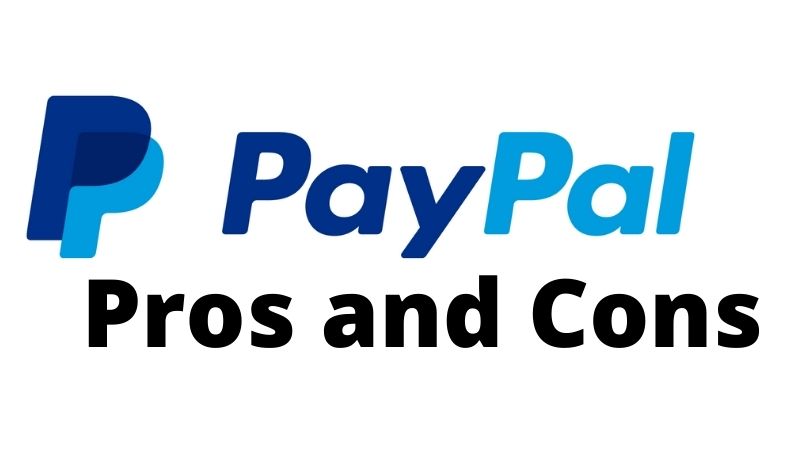The Pros and Cons of PayPal are a topic that’s been discussed for many years. The main question is, “Is it right for you?”
PayPal has both pros and cons. It all depends on what your situation is as to whether or not the benefits outweigh the negatives. In this article, we will cover some of the most common pros and cons of PayPal, so you can make an informed decision about whether it’s right for you or not.
Pros
Easy to use app: When it comes to finding PayPal pros and cons, the PayPal app for iPhone and Android makes it simple at any location in the world. The app provides several helpful features, and it is always in your pocket. The only downside to PayPal might be that it lacks the free customer service you get with checking account fees. The PIN and fingerprint protection in the PayPal app make it an inherently more secure way to transfer money than your credit card.
Records Transaction: Whenever you need a handy reference for your PayPal transactions, all you have to do is consult your account.
Creating and observing invoices for your business is simpler with this PayPal feature. Use a Calculator for PayPal transfer fees so that if an unsatisfied transaction has occurred, you have the option to request a refund.
For small businesses operating without a bookkeeper, you can use PayPal to go over your online financial transactions.
Sending money to friends and family is free- If you ever have to send money to family members at university or abroad, you’ll know that many providers will charge you for the transfer. One pro of PayPal is that it doesn’t charge to send money as a gift, such as to a friend or family member.
Safely Encrypted: PayPal has a security feature that encrypts all of your customer data and protects it against the highest level imaginable. Even though PayPal servers are vulnerable to hacking, customers can be confident about their safety when using PayPal as their payment option. Safety is the priority for PayPal to look after. It stores that data on servers that are not directly connected to the rest of the web. That means that even if PayPal’s public-facing servers are hacked, your data has a higher level of protection than with many other payment providers.
Accepted Everywhere: PayPal is accepted in over 200 countries, including the United States. This means that you will use PayPal when traveling abroad or even for goods and services at home. Again, this is a pro because not all online payment methods are accessible worldwide, whereas PayPal can be used just about anywhere.
Cons
Charges to receive money: Particularly on any websites – will charge you anything between 5 and 10 percent of the total price. That means that website sellers do not only face the fees imposed by the auction service but will also be charged when they finally sell their items and receive the money through PayPal.
Additional bank fees: Some banks require a fee when one transfers funds from their PayPal account to their bank account.
This varies from bank to bank but is usually a fixed amount regardless of the size of your PayPal payout. This is one of the major drawbacks of PayPal that it does not work for everyone.
Short-term withdrawal limit: The maximum you can withdraw in a single transaction is $500 or € 500
This means if your earnings from the last few months are more than this amount, then you will need to wait until they add up before withdrawing all of them at once. This is one of the major pitfalls when using PayPal and something many people don’t realize until it’s too late.
PayPal might hold on to your money: If you sell an item on your website, for example, you might have to wait a few days before that money is accessible through PayPal. PayPal disputes transactions that it deems risky, which can cause it to delay notifications about payments. Suppose you’re experiencing problems with your account. In that case, it’s usually because of one or more factors: low activity levels, chargebacks in the past, and things like selling electronics, gift cards, or event tickets which are more prone to fraud. Either way, this can happen to sellers who have not had much activity in their accounts, so be sure to keep a history of successful transactions.
Sometimes PayPal freezes accounts: A common complaint from PayPal customers is that their accounts are frozen without warning. Code that monitors transactions has thrown up unusual activity which, although above and beyond what would be considered a ‘normal’ transaction, might not have been picked up by the human eye. When PayPal freezes an account, it isn’t easy to send money or transfer funds to a bank account. PayPal can freeze money sent for online purchases until the item has been delivered, making cash-on-delivery (COD) transactions especially difficult.
Conclusion
PayPal is one of the most popular and well-known digital payment services. It allows you to send or receive money online without a bank account, credit card, or email address if desired. The service offers both buyers and sellers benefits, including convenience, security, and protection against fraud. However, there are some downsides, such as high fees for international transactions, which can make it inconvenient to use in certain situations. Overall though, we believe that PayPal has many great features that outweigh any disadvantages, so we recommend using this service at least once!
